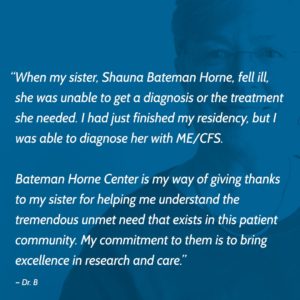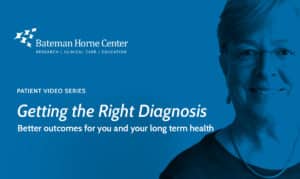Bateman Horne Center is guided by a board of directors that is intimately connected to ME/CFS and FM. Many have sons, daughters or are themselves managing an illness that has taken much of their life away.
The Horne in Bateman Horne
Most of you know that our organization is named after Dr. Bateman, but many don’t realize it is also named after her sister Shauna Horne. Shauna suffered from ME/CFS and later died of Non-Hodgkin’s Lymphoma. Shauna was a delightful person, mother to four, enjoyed her family, hobbies and a part time job.
This mission is personal for all of us at Bateman Horne Center.
Since its inception, Bateman Horne Center has been working to support those impacted by ME/CFS and FM by providing educational resources that can impact today’s quality of life for patients everywhere.We are simultaneously driving innovative research and bringing ME/CFS and fibromyalgia into mainstream medical education.
That will take time. What about right now?
We have developed an online educational series with Dr. B to offer guidance to those who feel beyond the reach of help.
With this new online resource, we seek to share the pearls from an in-person clinic visit with Dr. Bateman with viewers everywhere. This online educational series, like all of BHC’s offerings, is made available for free on our website. These are intended to be an immediate resource to help patients better understand their illness and to communicate effectively with their providers. Sign up here to access the online class series.
BHC Online Educational Series will include these 6 classes:
Getting the Right Diagnosis – Click here for immediate access
ME/CFS and FM present as complicated illnesses and getting the right diagnosis can be challenging or seem like an impossibility. Learn how to distinguish between these two diseases and recognize co-morbid conditions.
Activity Intolerance and Post-Exertional Malaise (PEM) – Available Friday November 16
Activity intolerance and PEM are often misunderstood aspects of ME/CFS and FM. Learn why physical and cognitive activities can cause symptoms to worsen and how to identify and improve the “threshold” of relapse. Review the importance of pacing and realistic expectation setting that can minimize and even improve symptoms.
Restorative Sleep – Available November 23
Poor sleep is a hallmark symptom of ME/CFS and FM. Not getting a good night’s sleep can worsen symptoms. Dive into the mechanics of sleep with Dr. Bateman and learn why sleep disturbances occur and how to implement strategies that improve them.
Chronic Widespread Pain – Available November 30
Pain is one of the most troubling and hard-to-manage symptoms of ME/CFS and FM. Dr. Bateman teaches about the various types of pain, how pain is amplified, and treatment strategies to improve your own pain management.
Cognitive Impairment – Available December 7
People with ME/CFS and FM often suffer from cognitive impairment that can lead to brain fog, trouble word finding and more debilitating symptoms. In this class, you will understand the types of cognitive issues that commonly occur, possible causes, and how to implement strategies for improving cognitive function.
Orthostatic Intolerance (OI) Syndromes – Available December 14
OI, Postural Orthostatic Tachycardia Syndrome (POTS), neurally mediated hypotension (NMH), and orthostatic hypotension can all be manifestations of ME/CFS and FM. In this class you will learn to assess orthostatic intolerance objectively, how to differentiate between these syndromes and strategies to manage the symptoms they present.
To the patient community: your courage and compassion in the face of pain, stigma, and disbelief gives us inspiration to continue our work. If you are willing to share, we’d love to hear (and share with our community) your story of hope and fortitude in the face of illness. If you are interested, please send us a direct email.
If you you find these classes beneficial we encourage you to make a donation to support the work of BHC. You can also follow us on Facebook, Twitter, Instagram, and Youtube, and subscribe to our monthly newsletter for updates on research, advocacy, and BHC news.

 Lucinda Bateman, MD, is a renowned clinician, researcher, and educator. Her Johns Hopkins University Medical School training instilled an approach to care that she has employed throughout her career - the patient comes first and the unknown or unexplained does not equate to a lack of proper and compassionate care. Since starting her own practice in 2000, she has served on six boards or committees, been the principal investigator for 45 studies, authored/coauthored 40 journal articles, served as adjunct instructor and adjunct assistant professor in the University of Utah Departments of Preventative Medicine, Internal Medicine, and Anesthesiology, and lectured around the world.
Lucinda Bateman, MD, is a renowned clinician, researcher, and educator. Her Johns Hopkins University Medical School training instilled an approach to care that she has employed throughout her career - the patient comes first and the unknown or unexplained does not equate to a lack of proper and compassionate care. Since starting her own practice in 2000, she has served on six boards or committees, been the principal investigator for 45 studies, authored/coauthored 40 journal articles, served as adjunct instructor and adjunct assistant professor in the University of Utah Departments of Preventative Medicine, Internal Medicine, and Anesthesiology, and lectured around the world.